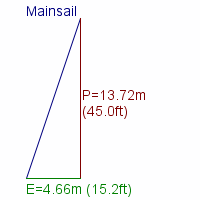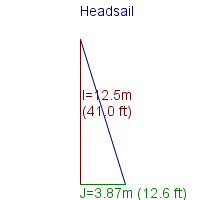Review of Sigma 36 (Thomas)
Basic specs.

If you have a photo you would like to share: Upload Image
Looking for a new boat? Find a Sigma 36 (Thomas) or similar boat for sale
Both the hull and the deck is made of fibreglass. Generally, a hull made of fibreglass requires only a minimum of maintenance during the sailing season.
The boat is equipped with 8 berths.
The Sigma 36 (Thomas) is built with a fractional rig. A fractional rig has smaller headsails which make tacking easier, which is an advantage for cruisers and racers, of course. The downside is that having the wind from behind often requires a gennaker or a spinnaker for optimal speed.
The Sigma 36 (Thomas) has been built with different keel alternatives.
Fin keel
One option is a fin keel. The fin keel is the most common keel and provides splendid manoeuvrability. The downside is that it has less directional stability than a long keel.
The boat can only enter major marinas as the draft is about 1.96 - 2.06 meter (6.43 - 6.73 ft) dependent on the load. See immersion rate below.
Full keel
Another option is a long keel. A full keel provide a better directional stability than a similar boat with a fin keel; on the other hand, better directional stability means also that the boat is more difficult to handle in a harbour with less space.
Sigma 36 (Thomas) can enter most marinas as the draft is just about 1.55 - 1.65 meter (5.09 - 5.39 ft) dependent on the load. See immersion rate below.
The Sigma 36 (Thomas) has been equipped with different engine alternatives.
Alternative 1:
The boat may be equipped with an inboard Volvo Penta MD11 diesel engine at 23 hp (17 kW).
Alternative 2:
The boat may be equipped with an inboard diesel engine at 28 hp (20 kW).
The transmission is a shaft drive. A shaft drive will in the long run require less maintenance than other types of drive e.g. a sail drive.
Sailing characteristics
This section covers widely used rules of thumb to describe the sailing characteristics. Please note that even though the calculations are correct, the interpretation of the results might not be valid for extreme boats.
What is Capsize Screening Formula (CSF)?
The capsize screening value for Sigma 36 (Thomas) is 1.98, indicating that this boat could - if evaluated by this formula alone - be accepted to participate in ocean races.
The immersion rate is defined as the weight required to sink the boat a certain level.
The immersion rate for Sigma 36 (Thomas) is about 255 kg/cm, alternatively 1432 lbs/inch.
Meaning: if you load 255 kg cargo on the boat then it will sink 1 cm.
Alternatively, if you load 1432 lbs cargo on the boat it will sink 1 inch.
Sailing statistics
This section is statistical comparison with similar boats of the same category. The basis of the following statistical computations is our unique database with more than 26,000 different boat types and 350,000 data points.
What is L/B (Length Beam Ratio)?
The l/b ratio for Sigma 36 (Thomas) is 3.15.
What is SA/D (Sail Area Displacement ratio)?
The SA/D for Sigma 36 (Thomas) with ISO 8666 reference sail is 18.1, with a 135% genua the SA/D is 20.8.
Maintenance
Dimensions of sail for fractional rig.


Are your sails worn out? You might find your next sail here: Sails for Sale
If you need to renew parts of your running rig and is not quite sure of the dimensions, you may find the estimates computed below useful.
| Usage | Length | Diameter | ||
| Mainsail halyard | 35.6 m | (116.8 feet) | 12 mm | (1/2 inch) |
| Jib/genoa halyard | 35.6 m | (116.8 feet) | 12 mm | (1/2 inch) |
| Spinnaker halyard | 35.6 m | (116.8 feet) | 12 mm | (1/2 inch) |
| Jib sheet | 11.0 m | (36.0 feet) | 14 mm | (0.55 inch) |
| Genoa sheet | 11.0 m | (36.0 feet) | 14 mm | (0.55 inch) |
| Mainsheet | 27.4 m | (90.0 feet) | 14 mm | (0.55 inch) |
| Spinnaker sheet | 24.1 m | (79.2 feet) | 14 mm | (0.55 inch) |
| Cunningham | 4.7 m | (15.3 feet) | 12 mm | (1/2 inch) |
| Kickingstrap | 9.3 m | (30.6 feet) | 12 mm | (1/2 inch) |
| Clew-outhaul | 9.3 m | (30.6 feet) | 12 mm | (1/2 inch) |
This section is reserved boat owner's modifications, improvements, etc. Here you might find (or contribute with) inspiration for your boat.
Do you have changes/improvements you would like to share? Upload a photo and describe what you have done.
We are always looking for new photos. If you can contribute with photos for Sigma 36 (Thomas) it would be a great help.
If you have any comments to the review, improvement suggestions, or the like, feel free to contact us. Criticism helps us to improve.
